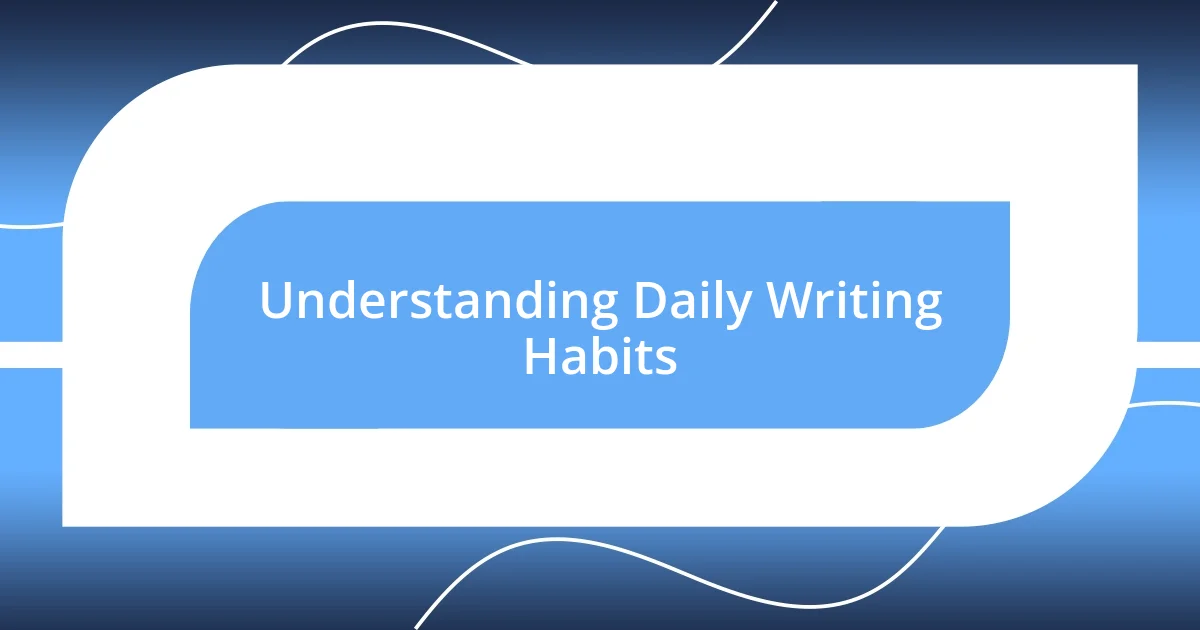Key takeaways:
- Consistency over intensity: Small daily writing sessions can lead to significant creative breakthroughs.
- Set realistic and flexible goals: Breaking down ambitions into manageable tasks allows for continued motivation and progress.
- Dedicated writing space and reflection: A personalized writing environment boosts creativity, while tracking progress and reflecting enhances growth.

Understanding Daily Writing Habits
Developing daily writing habits can feel daunting at first, but I’ve found that consistency is far more crucial than intensity. For me, starting small transformed my approach; even ten minutes a day can yield surprising results. Have you ever noticed that just putting pen to paper, even when you don’t feel inspired, often sparks new ideas?
One of the profound insights I’ve gathered is that writing isn’t just about output; it’s also about clearing your mind. I remember a particularly hectic day when I felt overwhelmed with thoughts. Dedicating a few quiet moments to journal about my feelings not only helped me process the chaos but also left me feeling lighter and more focused. Can you think of a time when writing helped you untangle your thoughts?
It’s also important to recognize the impact of environment on our writing habits. I once experimented with different spaces: my cozy corner at home, a vibrant café, even a park bench. Each location brought a different energy to my writing. Isn’t it fascinating how the right setting can unlock our creativity in unexpected ways?

Setting Realistic Writing Goals
Setting realistic writing goals is essential to maintaining motivation and progress. Initially, I made the mistake of setting overly ambitious targets, like completing a novel in a month. Instead, I learned that breaking my goals into manageable tasks—like writing 500 words a day—made the process feel more achievable. Have you ever set a massive goal only to feel discouraged when you couldn’t reach it?
Another consideration is how personal circumstances can affect your writing goals. Once, during a particularly busy season at work, I adjusted my targets to match my available time, opting for quality over quantity. By focusing on shorter writing sessions, I still made significant progress without overwhelming myself. This experience taught me that flexibility in goal-setting is crucial.
Finally, tracking your progress can be incredibly motivating. I started using a simple spreadsheet to log my daily word count, which provided a visual representation of my achievements. Each small victory boosted my confidence, reminding me that writing is a journey made up of countless tiny steps. Have you ever considered how tracking your goals might change your perspective on your writing journey?
| Goal Type | Description |
|---|---|
| Short-term Goals | These are achievable daily or weekly objectives, like writing a certain number of words. |
| Long-term Goals | These involve broader ambitions, such as completing a book or a series of articles over several months. |
| Flexible Goals | These adapt to changes in your life, accommodating fluctuations in your schedule and energy levels. |

Creating a Dedicated Writing Space
Establishing a dedicated writing space can significantly enhance my focus and creativity. When I first created a writing nook in a quiet corner of my home, I felt a transformation. The space, adorned with personal touches like photos and motivational quotes, became my sanctuary. Just the act of sitting there ignites a spark within me, as if my thoughts flow more freely in that specific environment. I’m curious—do you have a favorite spot that inspires your writing?
Here are some elements that might help you craft your writing space:
- Comfortable Seating: A good chair can mean the difference between a good writing session and discomfort that distracts you.
- Good Lighting: Natural light or a soft desk lamp can really set the mood. I’ve noticed that warm lighting calms me and helps me think.
- Personal Decor: Adding items that inspire me, like my favorite books or artwork, brings joy and motivation.
- Minimal Clutter: I aim to keep my desk clean. Less clutter leads to fewer distractions, allowing me to focus on what matters most—my writing.
- Sound Control: Whether it’s noise-canceling headphones or a white noise machine, finding the right auditory environment can help me tune into my thoughts without interruption.
By paying attention to these details, I’ve cultivated a space that feels uniquely mine, fueling my writing journey every day. What elements would you bring into your dedicated writing space?

Developing a Consistent Writing Routine
Developing a consistent writing routine can feel like a daunting task, but I’ve found that the key lies in creating habits that stick. For me, writing at the same time each day has transformed my approach. When I dive into my work every morning after my coffee, it signals my brain that it’s time to create. Have you ever noticed how routine can almost become a cue for your creativity?
I remember struggling to find the right time to write. I experimented with different slots, often feeling unproductive in the evenings after a busy day. Eventually, I discovered that carving out an hour in the early morning not only energizes me but makes for a peaceful environment to explore my thoughts. Isn’t it fascinating how the right timing can change everything?
Moreover, consistency doesn’t just mean showing up; it also involves setting the right intentions. Some days when I feel stuck, I allow myself to write freely without judgment, and other days I focus on editing previous work. This balance keeps my routine dynamic yet reliable. I wonder—how do you keep your writing practice fresh while maintaining that essential consistency? By embracing flexibility within my routine, I’ve found a rhythm that keeps my creative momentum alive.

Utilizing Writing Prompts and Exercises
Utilizing writing prompts and exercises can be a game-changer in my creative process. I often find myself staring at a blank page and feeling overwhelmed. That’s when I’ve learned to turn to writing prompts for inspiration. For instance, a simple “What if…” scenario can spark an entirely new story idea. I once wrote about a world where dreams could be shared between people. That exercise not only pushed my creativity but also helped me explore deeper emotions within the characters. Have you tried using prompts to break through your writer’s block?
Another effective technique I use is timed writing exercises. These require me to write nonstop for ten minutes, focusing on whatever flows from my mind. The freedom of those few minutes often leads to surprising discoveries—I might stumble upon a unique turn of phrase or an unexpected plot twist. I remember one session where I ended up crafting a character who refused to speak, unlocking an entire narrative around silence and communication. It’s incredible how a little pressure can ignite my imagination. What insights have you gained during your own timed writing sessions?
Lastly, I have found value in themed exercises that coincide with my emotional state. For example, during stressful times, I might focus on writing about joy or gratitude. This not only serves as a release but also helps me refine my writing voice by exploring different moods. I once wrote a piece celebrating small moments of happiness in daily life, and the process was cathartic. It became a reminder that writing can be both therapeutic and transformative. How do you explore your emotions through writing?

Tracking Progress and Reflecting
Tracking my progress is crucial for my growth as a writer. Every week, I take a moment to review what I’ve written, and it often surprises me to see how much I’ve accomplished. One time, I discovered I’d unintentionally crafted a comprehensive draft for a story I had nearly forgotten about. Have you ever been amazed by your own work simply by checking in on it?
Reflection plays an equally important role. After those weekly reviews, I jot down my thoughts about what felt good and what didn’t during the writing process. There was a time when I realized that I was writing more deeply when I restricted my word count. This insight reshaped my approach, turning constraints into creativity. Have you ever had a breakthrough just by taking a closer look at your writing habits?
To make tracking even more effective, I’ve started keeping a writing journal. I note down daily word counts, snippets of inspiration, and the emotions I experienced while writing. This isn’t just about numbers for me; it’s a way to connect with my creative journey. Once, I reflected on how vulnerability in my writing resonated with readers, and that realization pushed me to embrace more personal storytelling. Do you see the value in looking back at your writing experiences to guide your future work?

Overcoming Common Writing Barriers
Overcoming common writing barriers often requires a mix of strategies, and I’ve found that acknowledging my fears is a crucial first step. I remember grappling with self-doubt before submitting a piece for publication; it was terrifying. But recognizing that many writers face these feelings helped me push through. Have you ever noticed how naming our fears can often diminish their power?
Another significant barrier is perfectionism, which can paralyze creativity. I’ve learned to embrace a “good enough” mindset, particularly during my first drafts. In one instance, I wrote an entire story filled with rough edges and awkward phrasing, only to refine it later. It reminded me that the magic often lies in revision, not in achieving flawlessness right away. Have you given yourself permission to write imperfectly?
Lastly, I often encounter time constraints that make writing feel impossible. Balancing a busy life can be challenging, but I’ve adopted micro-writing sessions that last just five minutes. Surprisingly, those brief bursts of focused effort keep my ideas flowing and my momentum alive. There was a day when I jotted down an entire poem during my lunch break! Can you imagine what you could create in just a few minutes of dedicated writing?












